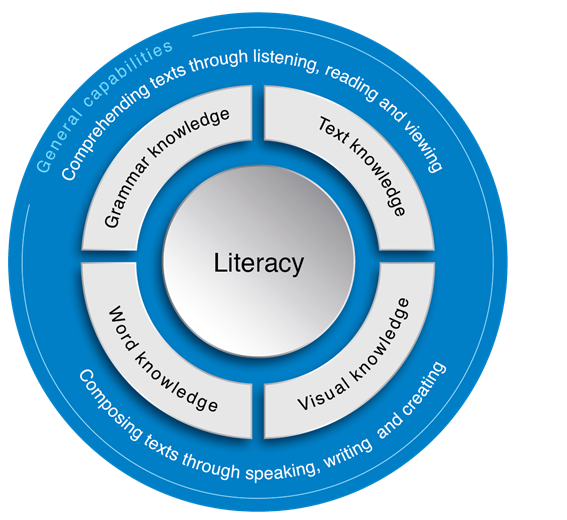Disciplinary Literacy – The Beginnings
Written by Bronwyn Milgate, Maree Marceau & Trisha Templeton, Teacher Librarians, Daramalan College
Bronwyn, Maree & Trisha are presenting at the Capacity Building School Libraries Conference - 18 & 19 June 2022 at Melbourne Convention & Exhibition Centre
Literacy is a vital skill for the 21st century and it is imperative for student mastery of practice that it is embedded across the curriculum. An important aspect of teacher librarianship is to support the development of literacy across the curriculum. This support can be whole school initiatives such as wide reading programs, the organisation of targeted intervention support for developing readers and the embedding of pedagogical strategies that support literacy teaching and learning. Whilst there may be several methods of improving literacy across the school, the development of disciplinary literacy requires strong pedagogical collaboration between faculty staff and the teacher librarian for optimum results. This is because disciplinary literacy is a multidimensional construct that requires the student to go beyond information extraction and have the capacity to critically analyse the text for the presence of nuances, contexts and procedural knowledge of inquiry (Hamilton & Stolle, 2016, p. 30). However, in order to do so effectively, students need targeted strategies and access to specifically curated resources so that they can develop the necessary skills to read, comprehend, reason, investigate, analyse and create texts specific to a particular discipline (Hamilton & Stolle, 2016, p. 30; Spires et al., 2018, p.1402).
Figure 1: Literacy proficiency requires the ability to comprehend and compose texts. (ACARA, 2014)
Disciplinary literacy is a critical component of teaching and learning in high schools because it is the next stage of literacy development as indicated in the literacy continuum (ACARA, 2014). The majority of students start secondary school at an intermediate level of literacy as most of them can address some textual misunderstandings, take notes, activate background knowledge and summarise their thinking (Morrow & Gambrell, 2019; Hannant & Jetnikoff, 2015, p.3). However, there seems to be an inability to transfer skills across the curriculum and this inability, combined with insufficient formal instruction in disciplinary literacy, means that students lack the relevant knowledge and skills to decode, decipher and comprehend information rich texts (Spires et al., 2018, p.1402). This lack of comprehension or information overload is a world-wide issue which limits the ability of an individual to interact with course specific texts and hampers engagement and success in that discipline.
Figure 2: Levels of literacy ability
There are several pedagogical strategies that are effective at embedding disciplinary literacy in the classroom. Resources and content are best approached through strategies that incorporate collaborative learning, discourse pedagogy, scaffolded instruction and guided practice (Hamilton & Stolle, 2016, p. 30; Morrow & Gambrell, 2019). However, the efficacy and effectiveness of the strategies are enhanced when resources are appropriately pitched to the students. This means students have increased access to the material and therefore become familiar with the disciplinary genre, vocabulary and content because it correctly captures language and the use of language in context. The texts simultaneously act as a model and teaching tool for students to improve their skill set which in turn improves their effectiveness at transforming the information they are extracting (Lawrence et al., 2019; Hamilton & Stolle, 2016, p. 30).
Improving disciplinary literacy in non-traditional literacy subjects is a targeted approach and requires collaboration between faculty staff and the teacher librarian. This is because these subjects have specific literacies, content, skills and knowledge requirements, however literacy instruction is often inferred rather than explicitly taught. In these situations, students are unable to transfer their knowledge and understanding to textual genres. The issue is often compounded by a cognitive dissonance between the teacher librarians and the faculties as
teacher librarians may be unfamiliar with the language and concepts of the subjects.
As Table 1 indicates, the goal of disciplinary literacy is equipping students with the skills to effectively extract, comprehend and compose texts. This can be achieved through the use of correctly pitched resources that are genre specific and contain the relevant vocabulary. This allows students to access and construct text and develop critical thinking within the subject.
Table 1: Planning disciplinary literacy pedagogical strategies.
Cross curriculum literacy development requires strong collaboration between the teacher librarian and faculty staff because collegial relationships are essential to improve student outcomes. Using evidence-based strategies of talking for learning, critical reading and writing for learning to facilitate transfer of information, disciplinary literacy can form part of the teaching routine in all subject areas. Teacher librarians bring their knowledge of quality resources, as they are able to adapt the resources to meet the needs of a diverse classroom, the subject area and the unit of work.
Bronwyn, Maree & Trisha are presenting at the Capacity Building School Libraries Conference - 18 & 19 June 2022 at Melbourne Convention & Exhibition Centre
References:
ACARA. (2014c). Literacy continuum. F-10 Curriculum - General Capabilities Curriculum. Educational Services Australia. https://www.australiancurriculum.edu.au/media/3596/general-capabilities-literacy-learning-continuum.pdf
Hamilton, Erica R. and Stolle, Elizabeth (2016) "The Importance of Disciplinary Literacy," Colleagues 13(1). http://scholarworks.gvsu.edu/colleagues/vol13/iss1/9
Hannant, K. & Jetnikoff, A. (2015). Investigating a disciplinary approach to literacy learning in a secondary school. Literacy Learning: The Middle Years 23 (3), pp28-37. https://eprints.qut.edu.au/84940/3/84940.pdf
Lawrence S., Langan, E., & Maurer, J. (2019). Using primary sources in content areas to increase disciplinary literacy instruction. The Language and Literacy Spectrum 29 (1). https://files.eric.ed.gov/fulltext/EJ1263061.pdf
Morrow, L., & Gambrell, L. (2019). Best Practices in Literacy Instruction (6th ed.) The Guildford Press. New York.
Spires, H. A., Kerkhoff, S. N., Graham, A., Thompson, I., & Lee, J. K. (2018). Operationalizing and validating disciplinary literacy in secondary education. Reading and writing, 31(6), pp1401–1434. https://doi.org/10.1007/s11145-018-9839-4



